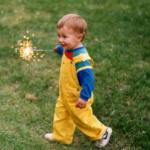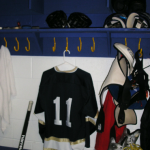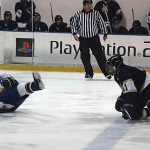The BYU hockey team, then known as the “Ice Cats,” was six goals ahead of the University of Northern Colorado on Jan. 21, 2005. Late in the second period, a UNC player lined up to take a long slap shot.
Eighteen-year-old BYU freshman Jaxon Logan dove in front of the shot and blocked it with his chest. When the puck hit him it triggered a pre-existing condition Logan didn’t know he had — commotio cordis, a heart arrhythmia caused by low-impact blunt trauma. The puck bounced off of his chest, which led to a goal by teammate Jeremy Weiss and an assist to Logan.
Although Logan’s heart stopped, he was able to get up and skate to the bench, where his teammates pulled him over as he tried to breathe. Logan was rushed to the hospital and later died from the incident.
Logan’s eulogy reads, “The most courageous play you will ever see in a hockey game is a defender diving in front of an opposing player’s slap shot to prevent that puck from getting near his team’s goal mouth. In the professional leagues, the hard, dense projectile has been clocked at speeds over 100 miles an hour.” Logan’s courage in diving for the puck that night exemplified the way he lived his life and ultimately left his legacy.
Logan was born and raised in Alaska and led an active life. He enjoyed fishing, hunting, snowboarding and scouting. In school he wrestled and played hockey. He loved music and was in the jazz choir. Right before he turned 18, he became an Eagle Scout. Throughout his life he was involved with church, having prepared his mission papers before his final game.
Logan’s memory still resonates with the people who knew him.
Ryan Newton, now an assistant coach on the BYU hockey team, was a freshman with Logan on the hockey team and grew close to him. “Jaxon pretty much lived with us,” Newton said about the time he and Logan spent off of the ice. “We became really close as a team, and after he died, we spent the rest of the season with a playing-for-Jaxon mentality.”
Logan’s death intensified the desire for the team to incorporate the spirituality of the BYU hockey program even more. “Eighteen is a young age to have someone so close to you pass away. It gave us a new perspective on life and how quickly it can be taken from you,” Newton said. “We wanted to make the spiritual aspect a bigger part of our team instead of taking it for granted.”
Today the hockey team strives to continue Logan’s legacy. Every year the team chooses a player to receive the Jaxon Logan award. “The Jaxon Logan Award not only represents Logan, but it gives the players something to work for,” Newton said. The coaching staff chooses a player who strives to give 115 percent just like Logan. This year, the Cougars honored Senior Captain Chris Tuttle on the 10th anniversary of Logan’s final game.
For Tuttle, Logan’s experience hits close to home. When Tuttle was a junior in high school, his best friend suffered a cardiac arrest during a pre-season practice and died. “The memory is still vivid in my mind, and it’s parallel to what happened with Ryan’s experience with Jaxon,” Tuttle said. “I remember after my friend’s passing, there were a lot of miracles that happened. I didn’t really have a strong testimony before, but I learned to rely on the Lord and the Atonement, and it helped me a lot.”
After Tuttle’s friend passed away, he thought he would stop playing hockey. “When I got to BYU I planned on focusing on my studies, but I felt prompted to join the hockey team,” Tuttle said. “Coming here with everything that happened to Jaxon helped me transition. When I saw his banner, I thought of my friend. It was a huge blessing to come here and have the atmosphere of spirituality that Jaxon helped build.”
Tuttle said Logan’s experience helps him understand the Atonement. “Jaxon set a perfect example of sacrifice for the team, and in a way, if you think about how the Atonement was the greatest sacrifice, you think of someone giving themselves for others, and Jaxon exemplified that. It was a huge honor to receive the award,” Tuttle said. “I try to continue his legacy by doing my best for my teammates as soon as I step on the ice.”
The BYU hockey team shut down Montana State both nights on the weekend it honored Logan. Goalie Mark Gantt said the wins were attributed to teamwork, which Logan exemplified. “Everyone is playing for each other,” Gantt said. “That’s been the big difference.”
The coaching staff keeps Logan’s legacy going by making sure everyone knows his story. “Everyone who comes into the locker room learns about Jaxon,” current BYU Head Coach Ed Gantt said. “(His legacy) is woven into what the team stands for, and everyone gets to know it.”
The team retired Logan’s number 11 jersey a couple years ago, and a banner hangs in the 2002 Olympic Provo Peaks Arena in memory of him.
Logan’s father, Michael, in a statement on Jaxon’s memorial website, said, “Remember when your feet hit the ice only a 115 percent effort is enough. Never quit until you hit the bench.” In this respect, Logan inspired others to give 115 percent effort not only on the ice but in all things they do in their lives.
Logan’s family set up a memorial website where those who know him can post memories and pictures. Those interested can learn more about him, his story and his legacy at www.rockonjaxon.com.














